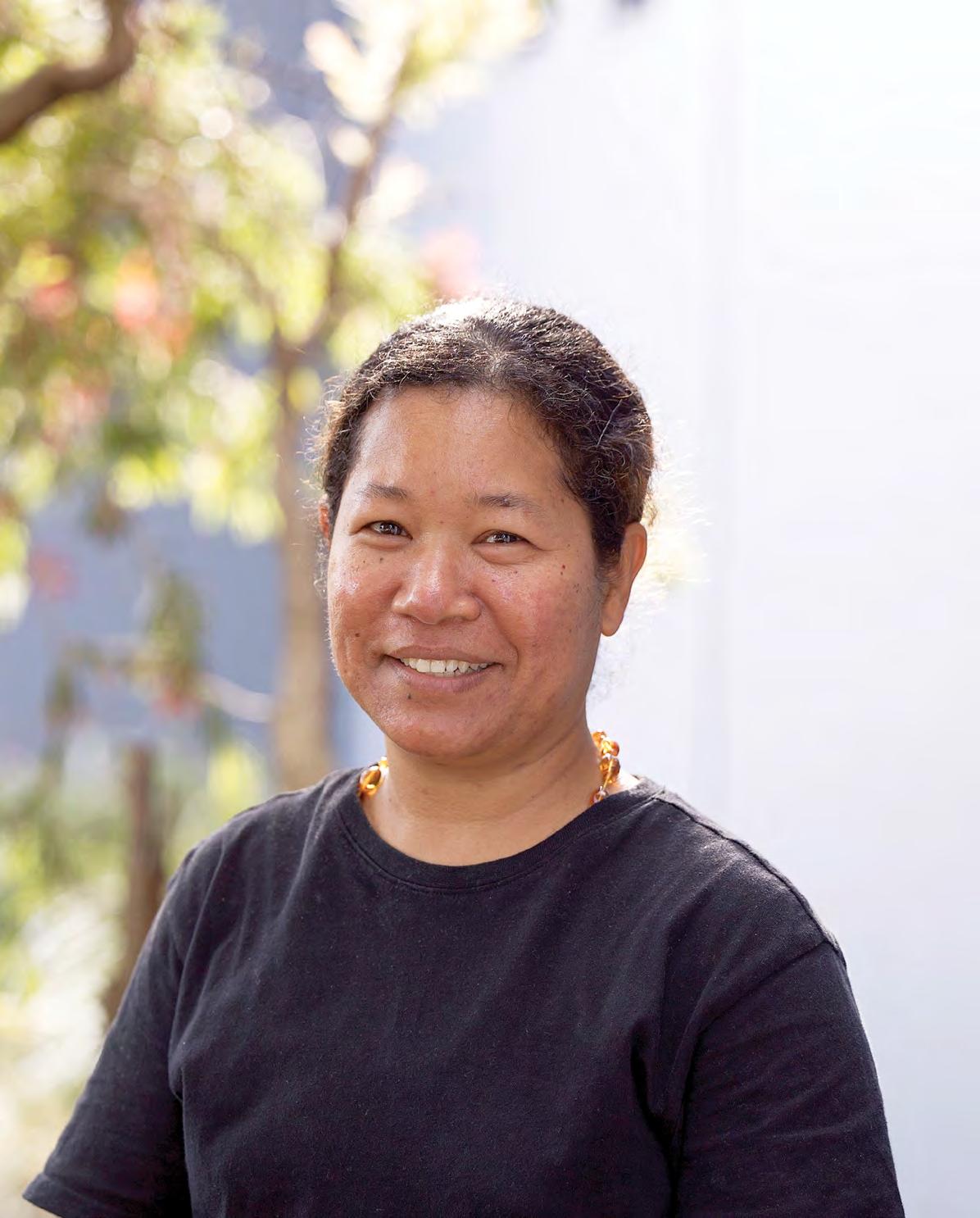
2022 VOLUME 4 A new home for Brightwater page 4 Making sure seniors’ rights are understood page 34 Bringing hope to seniors experiencing depression and anxiety page 16 Brightwater’s poet with a passion for helping people page 28 Forging a new path to finding the right staff page 8
Note from the CEO
Brightwater's CEO, Catherine Stoddart, reflects on a year of innovation in her editorial.
Brightwater’s new Inglewood campus
It’s what you don’t see that counts.
Brightwater and MercyCare team up to solve worker shortages
The innovative partnership demonstrates Brightwater’s commitment to finding new ways to recruit the right people.
Building capacity for life
Growing independence and opportunities through Brightwater’s unique approach to supporting people with disabilities.
Bringing joy to mealtimes
Aged care residents are loving the changes brought by ‘Reimagining the Meal Experience’.
Improving mental health for at-home clients
Twenty per cent of Australians over 65 will experience mental health issues at some stage. Brightwater’s new mental health program aims to help.
Supporting Brightwater leaf by leaf
Creating something different for donors who want an enduring and beautiful reminder of their connection to Brightwater.
New campus reimagines living environments for those impacted by Huntington’s disease
Read more in our special pull-out feature.
Ganesh Ghimire, our man of poetry
The surprising other life of a Therapy Assistant from Brightwater Oats Street.
Brightwater’s role in the research to make Advance Care Planning easier
A new study involving Brightwater at Home clients could help more Australians have a say in their future medical and personal care.
A pioneering plant breeder tells his story
His lifelong passion changed our gardens.
Championing the rights of older Australians
The collaboration between Brightwater and seniors’ rights group, Advocare, to better inform our staff and clients.
Transitioning for better outcomes
Brightwater’s Transitional Accommodation Program at Marangaroo is about more than just a place to go.
Brightwater’s roving reporter wrap-up

Here’s a roundup of a few of the activities that have taken place recently across Brightwater.
Brightlife
Volume 4 | 2022
Special thanks to our interviewees
Nicola Bedwood
Capacity Building clients: Ben and Parisa
Tricia Dewar
Liz Ennis
Louise Forster
Jenni Gamble
Ganesh Ghimire Niki Gannon Simon Grech Jen Jenkinson Dr Angelita Martini Warrick McAuley Keith Oliver Holly Reid Chloe Richter Adam Roebuck Mathew Scaffidi Sharidan Shimmin Dr Craig Sinclair Catherine Stoddart Than Than Juliana To Jasmine Trethewey Krish Veliyidathu Janet Wagland Phil Waldron Jacqui Whelan
Speak to us today on 1300 223 968 or email us at welcome@brightwatergroup.com
Brightlife is published biannually. You are receiving this magazine as you are part of our network of clients, family, friends and industry partners.
If you would prefer to be taken off our mailing list or if you have any ideas and comments about Brightlife send an email to communications@brightwatergroup.com
2
Follow us on social media @ brightwcg @ brightwatercare w ww.linkedin.com/company/ brightwater-care w ww.youtube.com/BrightwaterCare
Contents 03
08 04 14 16 18 28 30 32 34 36 38 19 10
Dear readers,
Welcome to the fourth edition of Brightlife magazine.
This edition, we are focussing on innovation and sharing stories from our clients, residents and staff that celebrate triumph and resilience.
It has been a few months since we moved into our new Head Office at Brightwater Central in Inglewood and it has been a pleasure watching the campus spring to life.
The move marked an exciting moment for Brightwater and in November we welcomed the first residents to our 128-bed aged care home, Brightwater Inglewood, on the second and third floors. See page 4 to learn about the technology working quietly in the background of this building to make it a great place to live and work.
In other news, the challenges our sector have faced in recent years, including staff shortages, have required some out-of-the box thinking. The story about our cover star, Than Than, and an exciting new partnership with MercyCare, on page 8 is a perfect example of this.
Than Than works in our commercial division at Brightwater Linen and was the first participant in the partnership which matches refuges with jobs at Brightwater. Challenges bring opportunities and I am proud to see the ways Brightwater is taking a progressive approach to addressing the shortages.
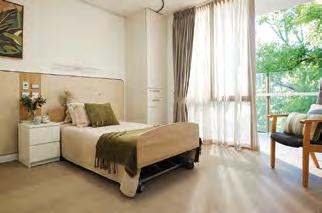


Four of our Capacity Building clients, and the staff who support them, have shared their stories on pages 10 to 13. Our Capacity Building Team provides a range of services that help to improve each client’s current abilities every day and these stories are heart-warming and inspiring.
Last year we told you how we were reimagining the meal experience at Brightwater. On page 14 we visit Onslow Gardens and learn how a new food service model is bringing joy and more choice to meal times.

We are also delighted to tell you all about our new campus to support those living with Huntington’s disease; showcase the support Advocare is providing to assist older people and those who care for them; share how our Transitional Care program is offering hope and new beginnings; and more.
Happy reading, Catherine Stoddart, Chief Executive Officer, PMS

3 10
8 4 14
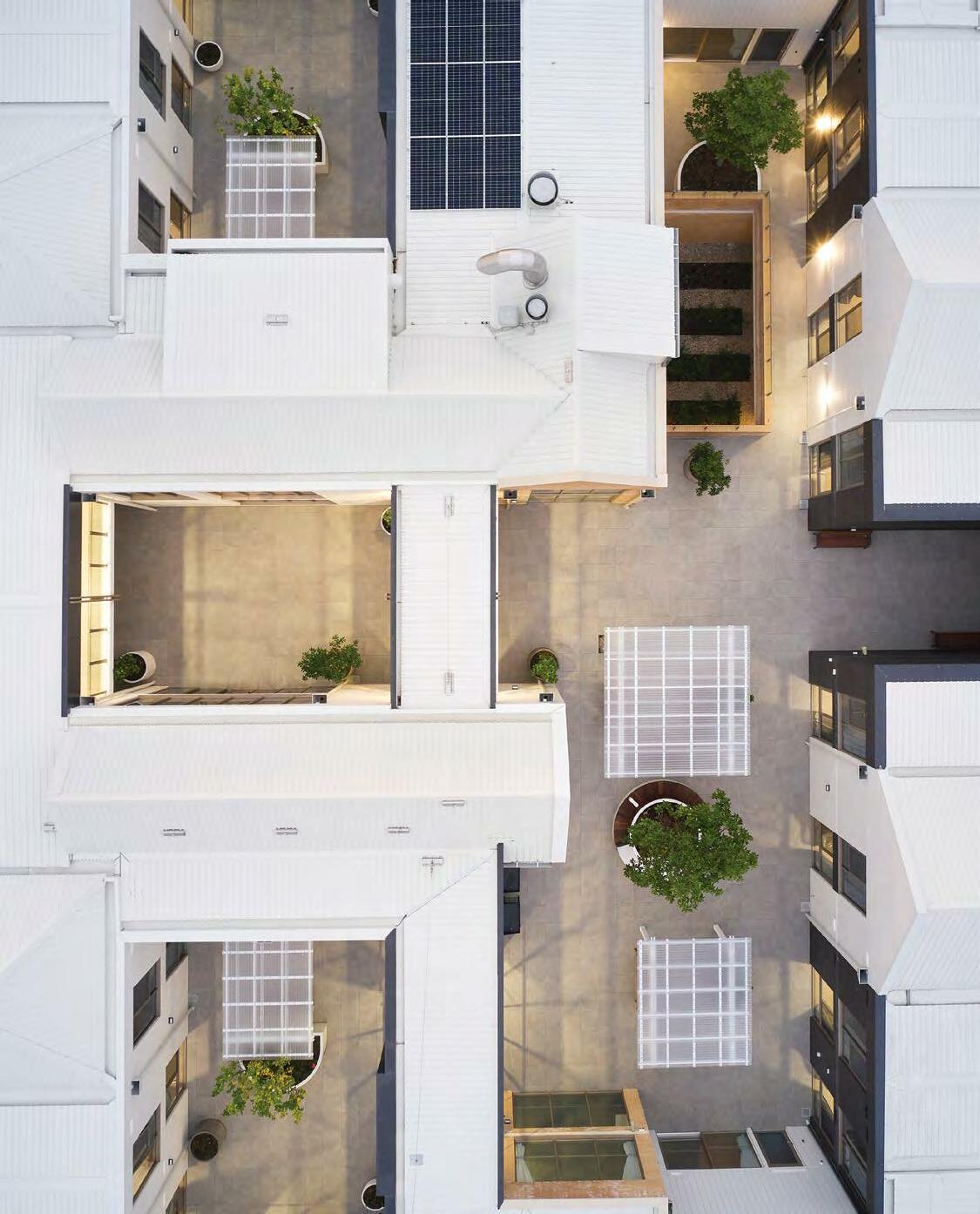
4
It’s what you don’t see that counts
The ground floor houses the new Head Office and the world-class Brightwater Research Centre while the floors above are occupied by our new 128 bed aged care facility, Brightwater Inglewood.
Like many of our homes, it is designed as a collection of small house communities, with 16 residents in each house sharing their own living areas including a kitchen and outdoor spaces.
Catherine says it has been exciting to see the result of this carefully planned project.
There is a lot to celebrate about the opening of Brightwater’s new multi-purpose building in Inglewood.
It is the first time that our corporate and research staff have been brought together with residential aged care clients under the same roof.
Brightwater Chief Executive Officer Catherine Stoddart says it is a concept that has been years in the making.
“We began with a vision to bring together the people we care for and the people who support that work, across corporate, training and research divisions.
“We wanted corporate staff to see elders being cared for right next to them.”
Brightwater Central is a three-storey building that sits in harmony alongside our established residential aged care home, The Village.
“We are delighted with just how well the holistic design for this innovative building has come together.”
In overseeing the design and construction phases, Project Director Adam Roebuck was committed to one thing.
“It's absolutely about resident wellness, staff wellness and creating opportunities for everyone to have really good environments in which to flourish,” he adds.
“I wanted people to feel comfortable, calm, safe and secure.”
With the needs of clients, staff and visitors at the centre of decision-making, the building has been designed to harness the latest in technology and sustainability.
It is a truly smart building, whose occupants and users will probably never be aware of the innovation operating behind the scenes to make it a better place to be living and working.
5
“ It 's absolutely about resident wellness, staff wellness and creating opportunities for everyone to have really good environments in which to flourish.”
Adam Roebuck, P roject Director
A smart building
The systems used to bring the new building to life work to support Brightwater staff, residents and visitors in three main ways: Clinical, operational and comfort/lifestyle.
Our residential aged care home, Brightwater Inglewood, has been fitted with one of the most advanced nurse call systems in Australia.
Nurse call systems are the primary means of communication between residents and carers, and this new system makes it easier for staff to care for residents around the clock. With the resident’s permission, staff are able to monitor each person individually as they move around their room and building, which leads to a safer living environment.
State-of-the-art heating, air conditioning and ventilation systems operate across all areas of the building.
Each morning, the ventilation operates a flush cycle, expelling stale air that has built up overnight and replacing it with clean air.
In the event of an infection outbreak, this can be done at a greater rate. The system brings in fresh air at double the rate set by Australian standards, increasing comfort and air health across all office and residential areas.
The operation of the building is automated and enabled through a state-of-the-art building management system. This is designed to ensure economical and efficient use of energy and water.
Internal lights are energy saving LEDs. These are managed through the system to ensure they are at the appropriate level of illumination for each area’s needs, across administration, training and aged care.
Solar panels on the gabled roof will provide over 22 per cent of the building’s electricity requirements. Water efficient fittings throughout will ensure water saving of around 60 per cent across the building and the waterwise gardens are beautiful and have low environmental impact.
Even during the construction phase, there was an emphasis on minimising environmental impact with an average 97 per cent re-use of all waste.
Committed to our clients
While the advanced features and systems are undoubtedly a highlight of Brightwater’s newest addition, the caring and commitment of the many people involved in bringing it to life is no less significant.
According to Adam, even the smallest decisions were made knowing they could have a big impact.
“The architect and the design team understood that the residents need a perfect view out to the window from their bed,” he says. “Hence we have floor to ceiling windows everywhere.”
Since the first sod was turned on the site in January 2021, there has been a mammoth effort by more than 2500 contractors and others to bring this project to fruition. Their commitment has impressed Adam.
“What you don't see is the millions of hours that have been poured into this building by people who absolutely care about our elders. That's what I feel most proud about.”
The result is a new centre for Brightwater’s operations that fits seamlessly into the landscape of today, while providing the space and inspiration for the next 50 years or more of innovation and care for the seniors of tomorrow.
For Catherine it is a proud time.
“Not only is this an exciting and innovative building, it’s also a place that reminds us on a daily basis of why we are here; to provide service in support of our core function of caring.”
6
With a background in both nursing and business, Liz has held a number of management roles including Facility Manager, Quality Manager and Operations Manager. She has also experience managing a dementia-specific unit.
“Here at Brightwater, I work alongside a team of professionals who understand the meaning of holistic care,” she explains.
Liz
proud to be Brightwater Inglewood’s first Service Manager
Brightwater Inglewood’s first Service Manager is Liz Ennis, who comes to us with more than 25 years of experience in aged care management.

Liz says her new role makes her feel both proud and privileged.
“A lot of love has gone into the planning of this environment,” she says.
“Brightwater has achieved an accommodation and lifestyle model that will serve the needs of our clients beautifully.”
“My main focus is to assist all staff to accommodate an environment that resonates with all our clients –an environment that means home.”
For Liz, the success story of her job is one where the clients are happy and fulfilled and glad they made the choice to live with Brightwater.
“My greatest wish is that clients are truly comfortable in these beautiful surrounds and they feel they can live their best lives here.”
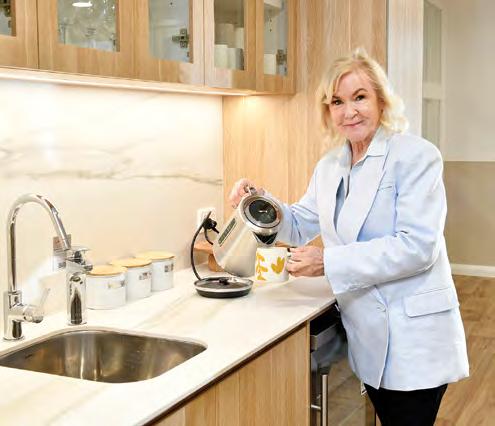
7
is
“ A lot of love has gone into the planning of this environment.”
Liz Ennis, S ervice Manager Brightwater Inglewood
Unique partnership between Brightwater and MercyCare counters worker shortage
Western Australia has been hard hit by the workplace shortages affecting many organisations in 2022, especially within the aged care and disability services sector.
But challenges also bring opportunities, and Brightwater is taking a progressive approach to addressing the shortages.
In recent months Brightwater, in conjunction with MercyCare, has developed a program to place people from refugee or asylum seeker backgrounds into jobs within Brightwater’s 2100-strong workforce.
Brightwater’s Talent Acquisition Specialist Holly Reid says the usual methods of securing staff are no longer working.
“It was a struggle to find laundry assistants,” she said. “We were definitely not being flooded with interested candidates.”
Holly says it was time to do something different to attract employees who would not only suit the roles but also Brightwater’s culture and values.
She says a partnership with MercyCare – which provides specialist employment services to refugees and asylum seekers – offered the right opportunity.
 Reid, Talent Acquisition Specialist at Brightwater
Reid, Talent Acquisition Specialist at Brightwater
“All the candidates we've had through MercyCare are authentic, courageous, progressive, and caring, and those qualities fit well with Brightwater values.”
8
A ll the candidates we've had through MercyCare are authentic, courageous,
caring.”
“
p rogressive, and
Holly
Together, Holly and MercyCare’s Employment Liaison Officer Jacqui Whelan have developed a program that identifies suitable candidates and then supports them through Brightwater’s application and onboarding process.
The first successful candidate, Than Than from Burma, came to Australia as a refugee seven years ago. In August she began working at Brightwater Linen in Malaga.

Providing wrap-around support
Jacqui says refugees and asylum seekers face significant barriers in their attempt to secure employment.
These include lack of familiarity with the job application process and Australian workplace practices, difficulty accessing necessary documentation, language and/or cultural differences and not having a support network.
The program put in place by Brightwater and MercyCare addresses some of these barriers by providing wraparound support during onboarding to ensure candidates can navigate the process. They also get follow-up support after they are placed in a role.
“It's wonderful to see Brightwater taking the opportunity to think creatively and open up opportunities for people who have structural barriers to workforce entry,” Jacqui said.
“It is also a way to work towards mitigating some of the workforce shortage that exists at the moment. It's a win win for everybody.”
Following the initial success with one new recruit, Holly and Jacqui were asked to put the program to the test with a bulk drive: Brightwater Linen requested 15 more employees in three weeks.
A flurry of activity followed, including group interviews and a tour of Brightwater’s commercial laundry facility in Malaga. In the end all positions were filled, which was a sign to Holly and Jacqui that the process would work moving forward.
“We're very grateful that we’ve been able to provide new opportunities for people, and at the same time gain fantastic new employees for Brightwater,” Holly added.
In following up with her MercyCare clients, Jacqui says she has received positive feedback about how they feel in their new Brightwater jobs.
“It's wonderful to see the enthusiasm and the great joy the people are getting out of it and the sense of pride as well. It's really lovely,” she said.
Just the first step
According to Holly, this is just the first step in opening up Brightwater’s recruitment process by providing support to help people from a range of cultures and backgrounds enter the workforce.
“The best part of my job is working with people who have been overlooked in the past because of a particular barrier and being able to overcome it with them to welcome them into Brightwater.”
9
Building capacity for life
Twelve years ago, life was going well for Warrick McAuley. After moving to Perth from New Zealand in the 1990s, he’d become a specialist roof plumber, made great mates and was enjoying weekends surfing at some of Western Australia’s best beaches.

Then, says Warrick, pictured above, the unthinkable happened.
“I sat down to watch the rugby as New Zealand was playing, and I went to grab my toasted sandwich from the coffee table, when the next thing I know I’m on the floor thinking, what the heck is going on?” he says.
10
Warrick had suffered a stroke, something that affects more than 100 Australians every day.
He spent time in hospital and then at Brightwater’s Oats Street Rehabilitation Centre. When he was ready to leave Oats Street, Warrick knew he would need help as one side of his body had been left significantly weakened by the stroke.
That’s when he turned to Brightwater’s Capacity Building Program, which provides support to people with disabilities so they can maintain a level of independence and work towards their individual goals.
The team to build capacity
Brightwater’s Capacity Building Program supports clients with a range of services so they can improve their current abilities in everyday life or relearn lost abilities. The program is tailored to each person and flexible to meet changing needs.
Program Manager Sharidan Shimmin says Brightwater’s approach is unique because it operates on a team-based model rather than addressing client needs separately.
“Brightwater has always set itself apart by making sure we can provide client-driven outcomes for adults with highly complex needs,” he explains.
“We support clients with a range of services such as physiotherapy, occupational and speech therapy. We have social workers and dieticians, and we can even help with housing needs. It's rare that a company offers this.”
The team approach is valued by Capacity Building clients like Mathew Scaffidi (pictured right).
“I feel like they're there for me. They help me with what I want to do, like giving me the right exercises to achieve my goals,” he adds.
Mathew has a degenerative condition and, after a long time in a wheelchair, he was getting closer to his goal of standing and walking independently.
Unfortunately, complications due to his condition meant that earlier this year, he had to have one leg amputated.
His team includes a Support Coordinator, Occupational Therapist, Therapy Assistant and Senior Physiotherapist. Together they’re helping him work towards his original goal.

“We work as a team to keep him able to live independently in his home, to be able to access the community to maintain his general wellbeing and independence,” Mathew’s Physiotherapist, Simon Grech says.
“It’s improving,” Matthew adds. “I've learnt how to transfer into my bed or into the car with the one leg. And I'm going to the pool every fortnight for exercises in the water. I've been so happy with them."
Sharidan adds: “We've got the best interests of our clients at heart, and we're really focused on how we can help them by working together.”
11
Complex needs, specialist care
The Capacity Building service includes some 40 health professionals with the depth of knowledge and skills to support people with highly complex needs to live a full life, at home and within the community.
The focus is very much on working alongside people who want to build their independence in their own way.
“So, we might visit them in their home but if that’s not a good environment for them or suitable, then we've got clinic based services,” Sharidan says. “If they live in supported accommodation, we'll go and see them there. If they're in aged care, we'll see them there.”
Accessing the Capacity Building Program is not just for those with National Disability Insurance Scheme (NDIS) funding, even though they account for a large percentage of clients.
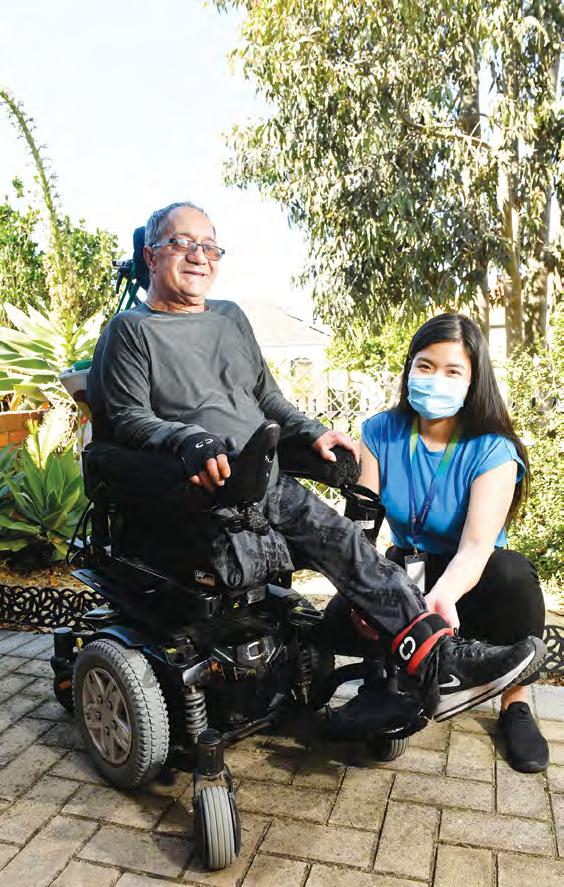
“Our clients can be an eligible participant of the National Disability Insurance Scheme, or they may have funding through the Insurance Commission of Western Australia,” Sharidan explains. "Or they may be fee for service and pay privately.
“Ultimately we are working within funding models that aim to help reduce the overall cost of care through developing skills to help clients live their best possible life.”
Former surf enthusiast Warrick knows what the best possible life looks like for him.
“To be able to walk down to the beach by myself and jump in the ocean. I haven’t been in the ocean for years and I love it,” he says.
Warrick is confident that the support of his Brightwater Capacity Building Team is giving him every chance of making it happen.
12
“
Brightwater has always set itself apart by making sure we can provide client-driven outcomes for adults with highly complex needs.”
Sharidan Shimmin, B rightwater’s Capacity Building Program Manager
Capacity Building is about seeing the possibilities
One of the best things about being with a team is that there is always someone looking out for you.
That’s true for the clients of Brightwater’s Capacity Building Program who are supported to make the most of life’s opportunities.
It doesn’t usually include flying, but it did this year for new Capacity Building Program client, Ben.
Ben lives with complex mental health issues and has been reluctant to leave his room or go out into the community.
When he expressed interest in trying indoor skydiving, his Specialist Support Coordinator, Krish Veliyidathu, saw it as a way to build trust.
“That has helped us to build a bit of rapport with him, showing him that something positive can happen in his life by engaging with support services,” says Krish.
Ben’s iFLY experience was made possible by Brightwater’ Life’s Possibilities program, which provides funding and support for activities, outings, events and experiences that improve clients’ socialisation and wellbeing.
Chloe Richter is a Positive Behaviour Practitioner with the Capacity Building Program. Her long-term client, Parisa, had always wanted to learn how to DJ.
“I always try and have something for clients to look forward to,” explains Chloe. “So I said to Parisa, let’s put in an application to Life’s Possibilities. When she was successful, she was so excited she couldn’t get her words out!”
On the day, Parisa was even more excited because it turned out her DJ coach was also a member of her favourite band, Pendulum.
“I love music, it is my passion and I got to try all the buttons. It’s always good to try something new,” Parisa said.
The Life’s Possibilities program is funded through community donations, and according to Krish, gives Brightwater clients like Ben and Parisa the opportunity to do something outside their everyday experience.
“This is a real motivation, for them to be able to say I can do something different in my life and if there is something I hope for, maybe it can be achieved,” he said.
To donate make a donation to Life’s Possibilities visit brightwaterdonate.raisely.com
13
“
This is a real motivation, for them to be able to say I can do something different in my life and if there is something I hope for, maybe it can be achieved.”
K rish Veliyidathu S pecialist Support Coordinator at Brightwater
Bringing joy to mealtimes
It’s not quite lunchtime but already the dining room at Onslow Gardens – Brightwater’s aged care home in Subiaco – is filling with residents.
They’re keen to peruse the menu and decide whether they will have the beef or the salmon, or perhaps the vegetarian pie.
Some will quietly ask chef Niki Gannon for a sandwich instead. Niki smiles. This is what she enjoys most about her job.
“It is about having that lovely relationship to enable our clients to make their own decisions, their own choices,” she says. “We’re looking holistically at how our clients are mentally and physically. That's very, very important.”
This is ‘Reimagining the Meal Experience’ in action. Brightwater’s innovative approach to preparing and presenting food was rolled out across all residential aged care sites last year.

The approach was developed in consultation with chefs, dietitians and speech therapists as well as clients. It has two key objectives according to Brightwater’s Hospitality Services Manager, Phil Waldron.
“Our main goal was to improve nutrition across the whole of the group, but we also wanted to bring the joy of mealtime to our clients,” he explains. “It is hospitality in the true sense of the word.”
14
Providing more choice
As part of the project, a new food service model is being trialled at Onslow Gardens. The team has moved from a system where clients pre-order meals – sometimes weeks in advance – to a daily a la carte menu, with three or four choices represented in pictures and words.
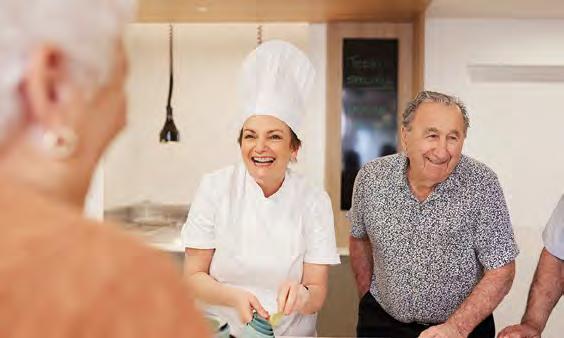
Every day, a range of pre-prepared meals are delivered from Brightwater’s central production kitchen in Malaga. Meanwhile, at site, the kitchen produces individual meals for clients with particular needs and diets.
Niki says this approach is working remarkably well.
I t is hospitality in t he true sense of the
“We've developed ‘Come Dine with Us’ where they can select from the menu and join their relative or a friend,” Phil says.
“I'm hoping that by getting families involved, we will get more feedback and more involvement, which will then facilitate further growth.”
Positive changes for staff and clients
‘Reimagining the Meal Experience’ is not just about the food. It is an approach that also prioritises the importance of the dining environment – with an emphasis on music to set the mood – as well as the relationships between staff and clients.
As new staff join Brightwater, their induction will include meal experience training, which will cover the importance of staff getting to know the clients and their needs.
“We’re giving people what they want to eat so they are getting better nutrition,” she adds. “And we have less wastage.”
Lunch and dinner options come from Brightwater Catering, along with a selection of snacks. Breakfasts and additional items – such as birthday cakes – are prepared at Onslow Gardens.
The team is also trialling buffet breakfasts, which have been met with great enthusiasm.
“We do bacon, sausage, eggs, tomatoes, Danish pastries and fresh fruit platters,” Niki says.
“It encourages people to come out of their rooms and engage, and to help themselves if they can.”
Meanwhile, Brightwater Madeley has become the pilot site for the newest part of the program, which provides opportunities for families to pay a nominal amount and share a meal with their loved one.
“Niki and other trainers will highlight the relevant touch points of what makes hospitality,” Phil adds. “And that’s a really positive change for the good because it's really the engagement with the people that's been the most important and the most fulfilling part of this project.”
More than a year after ‘Reimagining the Meal Experience’ was introduced, the overall feeling is that it has been a welcome change.
“When we do something new, it is received with such warmth and gratitude. Nothing is taken for granted. It's really beautiful,” Niki adds.
15
“
word.”
Phil Waldron, H ospitality Services Manager at Brightwater
Supporting Brightwater leaf by leaf
Our new Brightwater Central Campus in Inglewood is not just home to our head office and newest residential aged care facility, it is also set to become a place of celebrationand remembrance through a wall art installation that is beginning to take shape.

The Leaves of Life artwork will feature 460 stainless steel leaves that are engraved in honour of a person or an organisation with a connection to Brightwater.
The leaves can be purchased by families, individuals and corporate supporters at a cost of $500 per leaf. They will be engraved with a personal message and installed on the wall, with donors invited back to view and – if they wish – have a photograph taken with their leaf.
Brightwater’s Manager Corporate Engagement and Philanthropy, Nicola Bedwood, says she is proud to offer something different to donors who want an enduring and beautiful reminder of all those who are honoured.
“As this is also a fundraising project, we wanted it to represent Brightwater’s work in a visual statement,” she adds.
“In this design, the interlocking leaves remind us of the neural networks in the brain and so provide a connection to Brightwater’s world-class research and rehabilitation programs.”
The money raised through the Leaves of Life project will help grow the work of Brightwater’s philanthropic programs to help us pursue the dignity and independence for some of the most vulnerable in our community.
“It can go into research, to aged care, to brain rehabilitation,” Nicola says. “However, if a donor had a specific request for their funds to be channelled into a particular area, we would be happy to talk to them about it.”
Nicola Bedwood, B rightwater’s Manager Corporate Engagement and Philanthropy
Opposite the wall will be a bench where visitors can sit and reflect on the leaves and their connection to eight areas of importance to Brightwater: Brain health, brain injury rehabilitation, independence, ageing well, dementia care, quality of life, Huntington’s disease and nutrition.
“We are building a strong foundation, growing an emotional connection and providing a permanent display of support for our research and program capabilities, leaf by leaf.”
How to purchase your leaf
There are only a limited number of leaves available. If you would like to be part of this beautiful display, please visit brightwater-leaves-of-life.raisely.com or phone 9202 2800.
About the artists
Leaves of Life was created by Midnight Tuesday, which compromises established WA artists Philip and Dawn Gamblen and Peter Gee. They create public artwork, which encompasses lighting, kinetics and technology and were also responsible for the public artworks at the entrance to Brightwater Inglewood.
16
“ We are building a strong foundation, growing an emotional connection and providing a permanent display of support for our research and program capabilities.”
New campus reimagines living environments for those impacted by Huntington’s disease

With a long history of supporting people – and their families – with Huntington’s disease, Brightwater has begun planning for a world-class accommodation campus to help Western Australians impacted by the familial neurodegenerative disorder.
We have proudly provided specialised support for people living with Huntington’s disease for over thirty years. Dedicated accommodation options have been offered at Ellison House in Carlisle (for people in later stages of the disease) since 1998 and Kailis House in Cannington, then Belmont (for people in early stages of the disease) since 2009. While these supported independent living sites have been wonderful for the clients who have called them home, we are looking to the future.
The value of our expertise is demonstrated in the lived experience of our clients and respected by industry, researchers and stakeholders.
We stand with our clients during times of personal change, using our knowledge and skills to support them in directing their own life outcomes.
We value the generosity of community and corporate partners who enable us to achieve better outcomes for the people we support.
With this in mind, we are proud to use past learnings –and the input of people with Huntington’s disease and their families – to create a purpose-built campus in Piara Waters, about 28 kilometres south of Perth.
 Catherine Stoddart, Chief Executive Officer,
Catherine Stoddart, Chief Executive Officer,
PMS

About Huntington’s disease
Huntington’s disease (HD) is an inherited disease affecting areas in the brain which control movement, thinking and emotion.
It has a slow progression and symptoms gradually worsen over time. While there is no cure for Huntington’s at this time, there are medications and therapies that may alleviate some of the more common symptoms of the disease.
A neurodegenerative disorder that is usually inherited, an affected parent has a 50 per cent chance of passing it on to each child. It also can occur for the first time in a family.
The impact on a family of even one person with Huntington’s is significant, and more commonly, a few people across generations may inherit the gene.
For this reason, the Huntington’s campus will not only be about the people we provide direct care for, but their immediate and extended families.
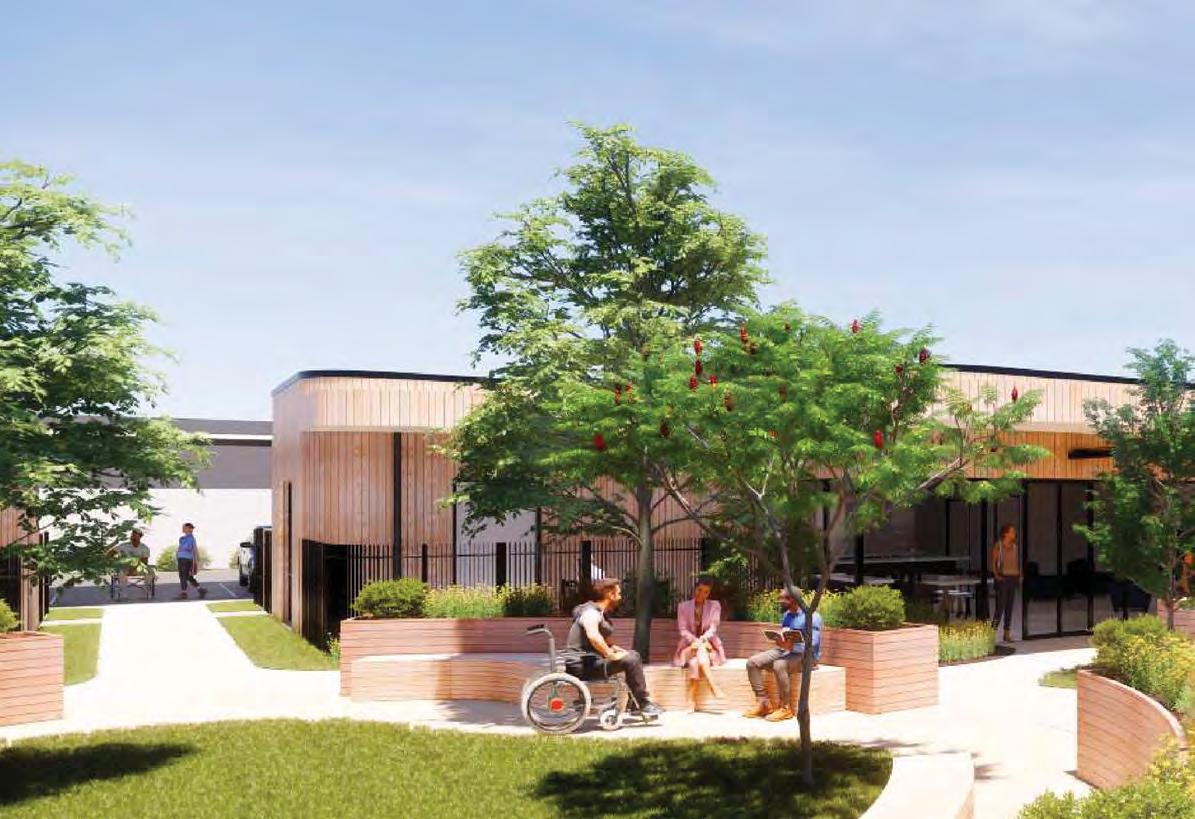
"
The living and working environments at the Piara Waters campus will be unique."
Reimagining living spaces
Backed by two decades of research and knowledge from Ellison and Kailis Houses, in 2020/21, Brightwater reimagined the living environments for those with Huntington’s disease and developed new design guidelines.

The living and working environments at the Piara Waters campus will be unique. An essential aim is that we build an environment that minimises the impact of the disease on the individual, whilst maximising their potential to live the life our clients choose in close collaboration with their families.
Each space has been designed to exceed the high standard of the Specialist Disability Accommodation (SDA) guidelines (housing designed for people with extreme functional impairment or very high support needs).
The homes will be purpose-built to accommodate clients from both of Brightwater’s current Huntington’s disease homes and will enable us to care for people in different progression stages on one site.
Vision for the future
Brightwater has a clear vision for the future: that all clients with Huntington’s disease can direct their own care, actively participating in their home environment and local community.
Equally important is a focus on creating programs and services that empower people with Huntington’s to age with dignity.
Making this vision a reality requires considerable resources. As a not-for-profit organisation, Brightwater relies in part on community and corporate generosity to enable us to deliver living environments that support people to live their best life.
We continue to be inspired by the willingness of individuals and businesses in WA to contribute to this goal.
About the project
The residential accommodation campus will be built to the highest standards. It will include 21 bedrooms and ensuites over seven houses with specialist assistive equipment and leading-edge technology in every zone.
The location was carefully chosen for its residential aspect and the property will feature a sensory garden with zones for living, relaxing, engaging and socialising.
Other features include:
Domesticity - the building will integrate with existing residential construction in the area whilst creating new forms using different materials.
Biophilic Design – Residents’ connection to the natural environment will be increased to enhance their quality of life.
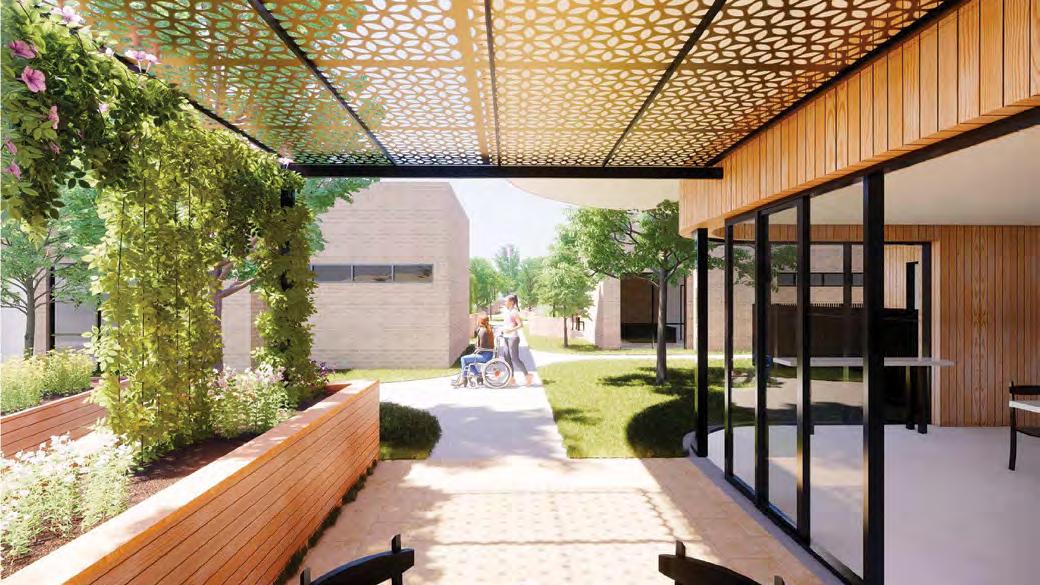
For example, an accessible main pathway connects all ‘garden’ spaces while way-finding points are located along the way through use of signage. Feature trees and sculptures will also be added to orientate residents along with rest spots along the pathway.
Streetscape – Facebrick work, timber cladding and greenery have been carefully selected. Each will provide different sensory experiences for the residents whilst being durable and robust with low maintenance requirements.
Homely living environment – Each house has ample kitchen, dining and living spaces for socialising, cooking, therapy, eating and activities plus views and connections to the outside.
The Family Room in each house allows for private gatherings and small group activities with access to a private courtyard. Each resident will have their own bedroom and ensuite, preserving their privacy and dignity.
Storage space for medical equipment, cleaning, linen, wheelchairs and general household items has also been incorporated into the design.
Enablement and Dignity
The NDIS Specialist Disability Accommodation Design Standard is at the core of these homes and Brightwater has gone beyond these standards.
Living areas, bedrooms and ensuites have been upsized; discrete ceiling mounted tracking will be installed where required and the base build electrical specifications will be future proofed so current and future technology can easily be adopted.
Meanwhile, climate control heating and cooling systems will be tailored for each resident’s comfort; emergency systems to improve the safer evacuation of the homes will be installed; robust yet contemporary interior finishes and surfaces have been selected and external internal and external spaces have been created to enable social interaction and family engagement.
Timeline at a glance
Phase 1
Brightwater secured land at Piara Waters in April 2022.

Phase 2
SDA is being secured for each client during their NDIS planning cycles. It will help Brightwater support its Mission to ‘pursue the dignity of independence’ by enabling clients to move into small, home like environments that offer more autonomy and reduce the need for supports.
A goal of developing SDA is to get young people out of aged care facilities and improve their quality of the life.
Phase 3 – Late 2022 to 2023
Cost of construction is currently estimated at $11.1 million and at present we have a shortfall of $2.5 million, which is the amount needed to complete the landscaping, internal finishes and specialist assistive equipment and technology to commission this this purpose-built Huntington’s facility.
The majority of the $2.5 million will be for costs incurred as a result of the “quality of life gap” which we have measured from the standard NDIS/SDA specification to what is required for those suffering from Huntington’s disease.
The additional design and care innovations will cost a total of $2.5 million and they are vital if Brightwater is to achieve its goal of providing world-class care to those who deserve it most.
Phase 4 – Early 2024 Completion
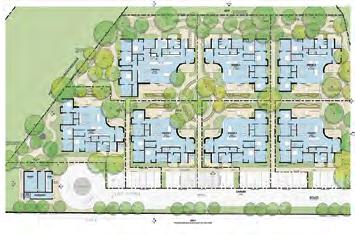
How you can help
With your help we can continue to build a world-class facility for those that deserve it most and one that will serve the WA Huntington’s community well into the future.
Each donation will offer a legacy to the individual or corporation who chooses to support us for years to come. As such, the level of recognition will be dependent on the level of support received.
Please see www.brightwatergroup.com/huntingtons-campus-piara-waters/ for more information and to make a donation.

Brightwater

Located in the heart of Perth’s inner suburbs, Brightwater Inglewood provides high quality care for people with a range of diverse needs, including those with dementia and high care needs. Backed by 120 years of experience in residential aged care, Brightwater Inglewood is built on the concept of a social model of care. It is located within Brightwater Central, a community campus that include our head office, world-class Brightwater Research Centre and our established residential aged care home, The Village.
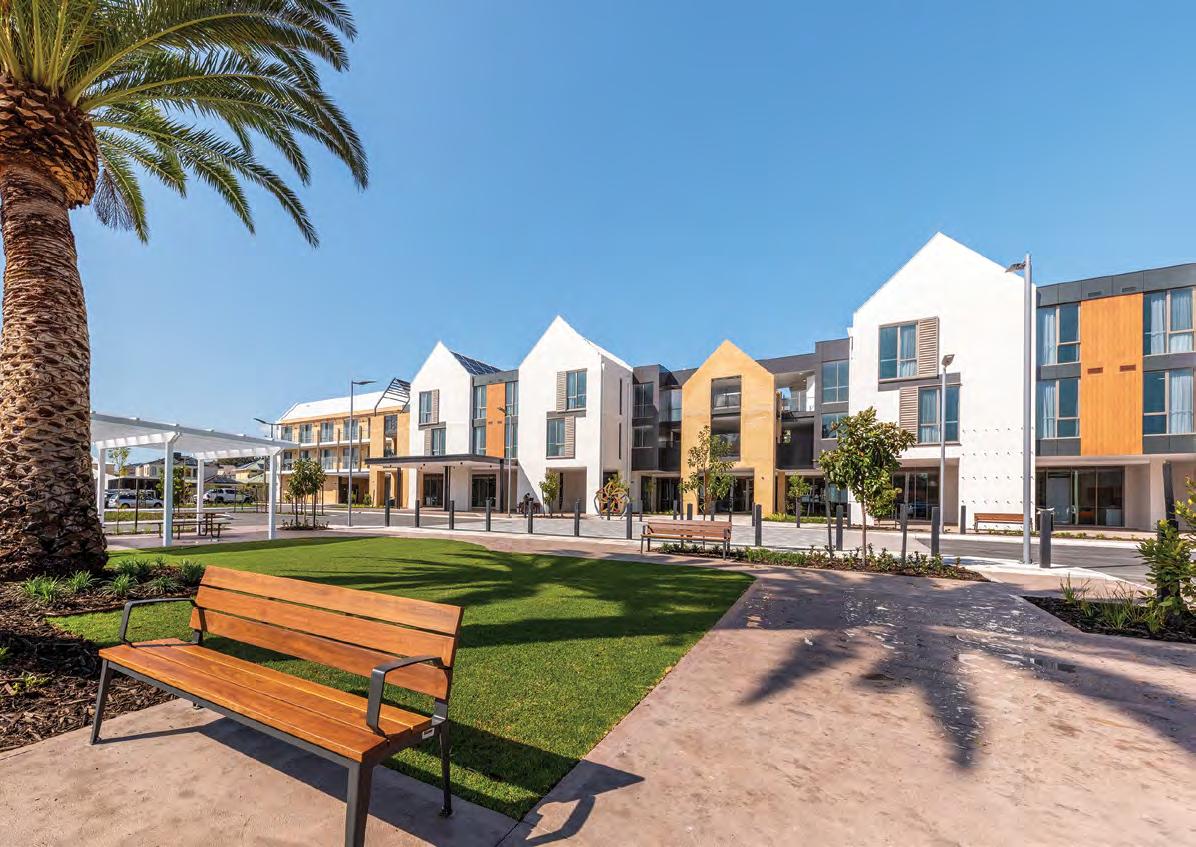
•
•
•
•
Brightwater Inglewood features:
Contemporary private rooms with ensuite bathrooms
•
L andscaped courtyards and spacious communal areas
S tate-of-the-art wellness gym
L atest care technology
Floor to ceiling windows offering views over the surrounding community.
Inglewood A brand-new aged care home in Inglewood 2A Walter Road West, Inglewood, WA 6052 1300 223 968 welcome@brightwatergroup.com brightwatergroup.com
Improving mental health for at-home clients
It’s easy to think depression and anxiety are problems of the young, but statistics show that at least 20 per cent of Australians over 65 will experience one or the other. It is often not well recognised and can manifest differently.
The problem is less visible in seniors, in part, because they are more likely to accept it as a natural sign of getting older, says the General Manager of Brightwater at Home, Jenni Gamble (pictured chatting with Jasmine Trethewey on page 17).

“It's very easy for older people to think that sadness, lack of sleep, loss of appetite and mood changes are a ‘normal’ part of getting older,” she adds. “But they are not a normal part of ageing and could be indicators of depression.”
Jenni has been leading a project to address the issue, after she was awarded Brightwater’s Don Hutchison Scholarship to investigate how to recognise, manage and prevent depression.
She and her team have seen first-hand that depression and anxiety could be significant issues for their at-home clients.
“I often hear about loneliness which many of our clients experience, and with loneliness come a greater risk of depression,” she said. “I am extremely grateful for the opportunity to explore this further through the scholarship.”
As a result, Brightwater at Home now has the tools and systems in place to help identify when clients may need support, and to help them do something about it.
26
Mental Health Screening Program
From the beginning of next year, mental health screening will be integrated into the onboarding process for new clients and become part of the regular care plan review for existing clients.
Brightwater at Home’s Mental Health Clinician, Jasmine Trethewey, says it is about flagging potential concerns and creating an opportunity to engage and support clients on their terms.
“Through this, we can advocate further action, including visiting the GP,” she says. “Or we might be offering something like social support to improve connection within the community and ideas around decreasing loneliness.”
In addition, Brightwater’s Community Support Workers are being educated about what they can do if a client begins to talk about their mental health, or if they notice changes that could signal something may be not right.
“Community Support Workers spend a lot of time with our clients and are in a good position to have conversations around mental health, even just gently asking: ‘is everything okay?’ And then being able to speak with the client’s support coordinator and highlight the shared concern,” Jasmine explains.
Jasmine says the goal is to provide a safe environment for clients to open up about how they are feeling, and provide support on the client’s terms. At that stage, Brightwater at Home will now have the resources and referral pathways to provide assistance.

“Identifying a mental health change is one part of the story,” she adds. “Actually engaging with meaningful care is an equal part of the story.”
Getting help at home
The new screening program represents an important step in addressing the mental health of older Australians, which was highlighted as a priority by the Royal Commission into Aged Care.
An increasing number of people are expected to stay in their own home for longer, and this will mean more services will be needed to support them, says Jasmine.
“There are now a number of different health disciplines visiting clients in their homes,” she explains. “Adding mental health professionals into that is a really important part. I want the clients to know that we're here for all of their care, and this includes their mental health.”
Start of a brighter future
Brightwater at Home’s Mental Health Screening Program will begin rolling out in early 2023. It could be the start of a brighter future for many at-home clients, says program manager Jenni Gamble.
“For me, measuring the success of the program would include someone waking up in the morning thinking about what the day is going to bring,” she says.
Trethewey, B rightwater at Home Mental Health Clinician
“It could be anything from being out in the garden, making a phone call, going to church, being a volunteer. It’s about somebody who can see that even though they're at a different stage, they are still enjoying their life.”
27
“ We want the clients to know t hat we're here for all of their c are, and that includes their mental health.”
Jasmine
Our man of poetry, Ganesh Ghimire
To his clients, Ganesh Ghimire is a caring and dedicated Therapy Assistant working in Brightwater’s Oats Street rehabilitation program.
“We work alongside the therapy team, with the Physiotherapists, Speech and Occupational Therapists,” he says of his role.
“The therapy team sets the program for the clients to reach their goals and we help to run those programs.”
Yet what Ganesh’s clients, and even his colleagues, may not know is that he is highly acclaimed in his birth country of Nepal and around the world as a poet and writer.
“When I was in College, I started writing long poems and these days I am writing more stories,” he says. “Most of my audience is Nepalese because I write in Nepali.”
Ganesh has published two books of his poetry and writing, with another two to be released by one of Nepal’s top publishing houses.

28
He has travelled the world as a keynote speaker at literary conferences and served for two years as the General Secretary for the International Nepali Literary Society. Ganesh says where he comes from, literature and poetry are a valued part of life.
“I’m from a farming family in the eastern part of Nepal, from where we can see all the Himalayan mountains with the white snow. My mum and dad, and my siblings are still there.”
Creativity and calm
Outside work, Ganesh has a busy family life, raising two young sons with his wife. His creativity and dedication to poetry just may be what helps him maintain the demeanour he is known for, as a valued member of the Brightwater Oats Street rehabilitation team.
“I don't get irritated. I always stay calm. And people say to me, even in hard situations you are always smiling.”
G anesh Ghimire, T herapy Assistant
From Nepal to Perth
As a young man, Ganesh set out to travel the world, including Perth where he was visiting friends when he decided to apply for a student visa and make this faraway city his new home.
He first started with Brightwater Oats Street as a Support Worker in 2009 and quickly made a good impression. Within two years he was promoted to Therapy Assistant, a role he still occupies after almost 10 years.
“The clients come here with different issues and slowly they get back their life and they get more independent. That makes it enjoyable to work at Oats Street,” he says.
Ganesh says he also likes to be part of a team and takes pride in supporting both his clients and his colleagues.
“In Nepal, I used to work in the community there too, but in a different role. I always like to work with people and once I started my job here, I really enjoyed that part of it. I think this is my strongest side – working with people.”
The Language of Tears
Ganesh Ghimire, 2021
Those who have no speech of their own Or are extremely feeble Can speak with their eyes And keep their life going.
Of all weapons The tear is the simplest, most decent and invisible one Whom the eyes carry along Right from the moment of birth.
29
“
I’m from the eastern part of Nepal, from where we can see all the Himalayan mountains with the white snow.”
Brightwater’s role in the research to make Advance Care Planning easier
Do your loved ones know your wishes for your future health and personal care?
If so, you may have prepared an Advance Care Directive. This is a formal instruction detailing such things as:
• Who is authorised to make medical decisions on your behalf if you are no longer capable.
• Which treatments and care you would accept or refuse if you experienced a life-threatening illness or injury.
• What ‘living well’ means to you based on your values and preferences.
Making this information available to health care providers and loved ones can reduce stress and anxiety in the later stages of life. Yet, according to a study by Advance Care Planning Australia, only 14 per cent of Australians aged 65 years and over have an Advance Care Directive.
Now, a study involving participating Brightwater at Home clients aims to change that.

30
“
Telling their own story will help them identify what would matter most to them if they couldn't speak for themselves.”
D r Craig Sinclair, L ead Investigator
Improving EARLI intervention
The title of the study is the ‘Enhanced Advance care planning and life Review Longitudinal Intervention’, also known as EARLI. It is a fitting acronym as one of the goals is to support Australians aged 65 and over to formalise their advance care wishes at an earlier stage, according to Lead Investigator, Dr Craig Sinclair.

“I've seen a lot of advance care planning work that happens at a crisis point when people go into hospital or when they go into residential care,” he says. “And often that's too late because due to their condition, these people may be unable to speak for themselves at that time.”
The EARLI study will conduct a pilot program with several hundred aged and home care clients in Western Australia and New South Wales. Participants will be guided to think and talk about what is important to them as their health and personal needs change.

Brightwater is one of 12 aged care service providers involved in the study, conducted by Dr Sinclair with researchers from the University of New South Wales and other collaborating Australian universities.
Director of the Brightwater Research Centre, Dr Angelita Martini is one of the investigators on the program.
“This study will support the discussion between a person, their family and health professionals to clarify goals for future healthcare in case there is a time when they are unable to make or communicate health decisions,” Dr Martini says. “By developing intervention materials and training for staff, the study will facilitate community-based aged care services to engage in advance care planning.”
How does it work?
Participants in the study will be visited at home, over several weeks, by a trained facilitator who will guide them through conversations about their beliefs and values, drawing out what matters most to them.
Part of this will be through a process known as Life Story Work, which involves participants reflecting on the experiences, roles and relationships that have been meaningful to them across their lives. The study aims to find if this approach will make it easier for people to then develop their own advance care plan, with support, as well as improve overall emotional and social wellbeing.
“We're hoping that telling their own story will help them identify what would matter most to them if they couldn't speak for themselves,” Dr Sinclair adds.
“It's not just about getting a form filled out but also about the really important conversations people have with their doctors, with their family members, and with their care providers.
“One of the hypotheses is that if we can help people to feel clearer about what they want themselves, they'll feel more ready to actually engage in those discussions.”
Early next year, a small number of Brightwater at Home clients will be invited to participate in the study. It is anticipated that their involvement will benefit not only them as individuals but may also help lead to more Australians having a voice in their future care.
31
Pioneering plant breeder tells his story
Perth gardens have changed enormously over the past century with English style landscaping slowly giving way to include more native species. It’s a move that pleases Keith Oliver, a resident at Brightwater’s residential aged care home in Subiaco, Onslow Gardens.

Through his pioneering work as a plant breeder, Keith has been instrumental in helping to promote the beauty in Australian plants. But he admits it wasn’t easy at the start.
“People in those days thought there were garden flowers and there were wildflowers, and never the twain shall meet,” he says.
Well, I thought this was folly because all plants are wild somewhere or other. So, I set about breeding kangaroo paws to show what could be done.”
Kangaroo paws have been Keith’s great love and he is highly regarded as a pioneering breeder of the distinctive plants.
32
At first, it was a hobby to be pursued around his full-time job as a carpenter and house builder. But what he describes as a ‘lifelong obsession’ slowly turned into a profession and a thriving business.
“I had my own garden at home and gradually that took over. Gardening and the kangaroo paws became the most important thing,” Keith says.
nslow Gardens resident
While still a hobbyist in the 1960s, Keith began to work on breeding hybrid kangaroo paws, with the aim of developing disease resistant varieties that could handle a range of climatic conditions. He focused on working with the tall varieties as these were tough, long-lived and more easycare than the smaller ones.
Keith saw that one variety in particular, Anigozanthos flavidus, could give him the results he was after, and his breeding program led him to release the landmark, Anigozanthus ‘Big Red’ kangaroo paw.
This showy plant continues to be one of the most popular kangaroo paws for landscaping, both in Australia and overseas.
Keith is still quietly proud of his work to bring the kangaroo paw to greater prominence in our gardens.
His contribution is recognised by many within the gardening world. This includes horticulturist, author and former television presenter, Angus Stewart who made a point of visiting Keith a few years ago when he was in Western Australia for the ABC’s Gardening Australia program.
“I’ve greatly respected Keith’s work and to finally meet with him after several decades was an incredibly rewarding experience,’ Angus told Perth horticulturalist Deryn Thorpe.
These days, Keith gets pleasure from watching the birds enjoy the native plants around his aged care home in Subiaco.
Onslow Gardens’ Service Manager, Jen Jenkinson, says Keith has been a big part of planning for more natives.
“When I met Keith, our first conversation was about kangaroo paws with a request for a native garden,” Jen adds.
“When one of our gardens was about to be renovated, Therapy Assistant John Oakes knew just the residents to band together, with Keith to guide our native garden project.

“The residents selected the plants, planned the layout of the garden and kept watch over the works as the garden was transformed with native plants and the star kangaroo paws. “They enjoy sitting in the new gardens and watching the birdlife visit.”
Keith’s advice for today’s gardeners choosing what to plant remains as it was all those years ago when he started out.
“Kangaroo paws are pretty drought tolerant so that would be a good start,” he says. And other plants to go with them? No, says Keith: “I just love kangaroo paws”.
33
“
It ’s been a lifelong obsession I suppose you could say.”
Keith Oliver, O
Championing the rights of older Australians
Getting older brings many changes but one thing remains the same – our rights.
According to the Australian Human Rights Commission, no matter what our age, we are still entitled to – among other things – be safe and free from violence; have the highest possible standard of mental and physical health; and be free from cruel, inhuman or degrading treatment.
Yet not all older Australians are aware of the protections and support that are available to them as their living and personal situations change.

The Western Australian not-for-profit group, Advocare, seeks to change that by providing advocacy, information and education services to older people and the people who care for them.
Advocare has recently provided training sessions for Brightwater’s newest Registered and Enrolled Nurses to ensure that clients’ rights are understood by staff as well.
Information sessions are also held in Brightwater’s residential aged care facilities allowing clients to better understand their rights and to learn what they can do if they have any concerns.
CEO of Advocare Louise Forster says collaboration with providers like Brightwater enables the organisation to reach the people who might need support.
“One of our main aims is to ensure that more people know about rights in aged care and how to exercise those, whether that's for themselves or a family member or someone they work with,” she explains.
“We're on the journey of collaboration to ensure that message is really important to anyone that's in Brightwater’s sphere.”
The work done by Advocare covers three main areas:
• Providing advocacy and information about the rights of the older person;
• Combating elder abuse; and
• Delivering the Community Visitors Scheme.
34
Advocacy and information
The aged care system is complex and can be overwhelming.
Advocare can provide advice and information about the range of support available, from at-home packages to residential aged care.
Advocates also helps to inform people about the Aged Care Act and the Charter of Rights, as well as the Aged Care Quality and Safety Standards. This information can help residents and their families to better understand what they can do if something doesn’t feel right.

“Most people aren't aware of all things they need to know and how to advocate for them,” Louise says.
“There’s a lot of information to take in when someone enters aged care or is doing the research for it.
“Our advocates can attend residents and families meetings. They can be really helpful in explaining what the system looks like, and what fairness and equity look like.”
Combating elder abuse
Advocare operates a free and confidential WA Elder Abuse Helpline, where callers can discuss any concerns about a situation that is causing them harm or distress. The helpline (1300 724 679) operates from 8.30am to 4.30pm, Monday to Friday.
Louise emphasises that the older person is always in charge of what happens after they raise issues with any of Advocare’s staff, from the helpline to the other advocacy services.
“We are free, independent and confidential so we will never take any action without the person asking for it,” Louise adds. “We don't get the information then take it upon ourselves to follow up. Its only led by the individual.”
The Community Visitors Scheme
Advocare delivers this federally funded program which links volunteers with eligible older people, helping to reduce social isolation for people who live at home or in residential aged care.
“It links really well to the work we do because people might be victims of elder abuse or having some issues around their rights being infringed, but they haven’t had people around them to give them information,” Louise explains.
“So if they have a community visitor – and those relationships build – then the visitor will often have some idea about the services that we offer.”
Helping to advocate
Louise says one of the aims of Advocare is to ensure that more people know about, and understand, the rights of older people. Working with a provider like Brightwater helps to achieve that goal.
“Families, prospective clients, staff and service providers: it's about the community championing the rights of older people,” she says.
35
“
It's about the community championing the rights of older people.”
Louise Forster, A dvocare CEO
Transitioning for better outcomes
Located in Perth’s northern suburbs in an accessible garden setting are four houses that provide a safe and supportive environment for clients to make a transition back into the community following a life changing event.

This is home to Brightwater Marangaroo’s Transitional Accommodation Program where people with disabilities, aged 16 to 65, who are ready to be discharged from hospital (but not quite ready to move into a supported living environment or return home) can rest and recover.
These clients have had a longer than expected stay in hospital due to a number of health, disability or social issues.
As Tricia Dewar, Brightwater’s Manager Rehabilitation and Community, explains, the program is unique as it supports clients to resolve these issues before they move into community living.
“The program is focused on the whole person,” she said. “It is very much driven by the wishes of the person and their families in terms of addressing individuals’ circumstances, or barriers that are preventing them from successfully transitioning to back into community living.”
Tricia says the clients who come to Marangaroo can have multiple challenges.
“They might have diabetes Type 2, as well as a mental health diagnosis, that are not well managed,” she says. “They may have early onset dementia or have had an amputation. They often have family or social issues.
36
“They may be eligible for the Disability Support Pension, but have not applied for it, or they may be getting the pension but not accessing the other benefits that would support them to live a better life.”
We look for answers and novel solutions fo r each client.”
Wagland, G
Working as a skilled team
Tricia says the team at Marangaroo is skilled in working with clients to address any challenges they face.
When a client enters Marangaroo they are allocated a key therapist who is the go-to person for that client and their family.
The client works with the relevant allied health and nursing professionals on goals that are individual to them, with disability Support Workers providing day-to-day supports.
“The issues may be how the client’s health is managed or bringing better stability around mental health,” Tricia adds.
“It's about developing a care plan and team around the person that enables them to move into an appropriately funded – usually a NDIS-funded environment – with the appropriate team of their choice around them.”
The Brightwater Marangaroo team, including Program Manager Adelene Yap and High Care Coordinator Lyn Maitland, has a depth of experience and commitment that means they are uniquely placed to work with these diverse clients who have complex support needs.

“Because everyone’s circumstances are so very different, it's really important that we have a team that's able to effectively identify the individual challenges and look for answers and novel solutions for each client,” Janet Wagland, General Manager Disability says.
Life at Marangaroo
Clients have the opportunity to participate in skill building groups and get support to rebuild their daily living routines. Marangaroo has flexible visiting arrangements for family and friends and places and opportunities for clients to socialise together. The length of stay depends on the client’s readiness as well as the availability of suitable accommodation and support providers.
“The last thing we want is to discharge someone and then find they've gone back into hospital, and you've got to start all over again,” Janet says. “Because then the client becomes more disillusioned, and it gets even more difficult.”
Client goals drive the program
Janet says transition is not just about moving people from one place to another, but about understanding the person and the life that they want to lead.
She says the goal of Brightwater’s Transitional Accommodation Program is to enable the client to reach the outcomes they want, as much as possible, based on their unique goals.
“I believe this model of service achieves great success with the individual, because it is about the individual achieving what they want,” she adds.
"So that ultimately, when somebody does move on to what's going to be their long-term living option, it’s going to be their best choice and offers them a lifestyle that meets the outcomes they want for themselves.”
37
“
Janet
eneral Manager Disability at Brightwater
Brightwater’s roving reporter wrap-up
Here’s a roundup of a few of the activities that have taken place recently across Brightwater.
Clare and Janet present at National Disability Summit
Our NDIS Integration Coordinator, Clare Meredith, and General Manager Community, Janet Wagland, attended the National Disability Summit in Melbourne on 15 and 16 August.

The pair presented on 'Aspiring to zero young people in Aged Care with a Disability is great, but what are we doing in the meantime?'
Clare and Janet spoke about the national targets for people under the age of 65 moving out of residential aged care; the key issues that NDIS participants experience when living in residential aged care; and receiving services from external NDIS providers.
Moving in
Brightwater staff moved into their new Head Office on the ground floor of Brightwater Central on Walter Road in Inglewood in mid-August.
The move paved the way for the first residents who will live on the first and second floors in our brand new residential aged care home Brightwater Inglewood.

38
Distinctive sound transports residents to Scotland
The sounds of the Scottish highlands resonated around our aged care home Brightwater Redcliffe, when Scott Hannah from Perth Bagpipes performed for our residents.
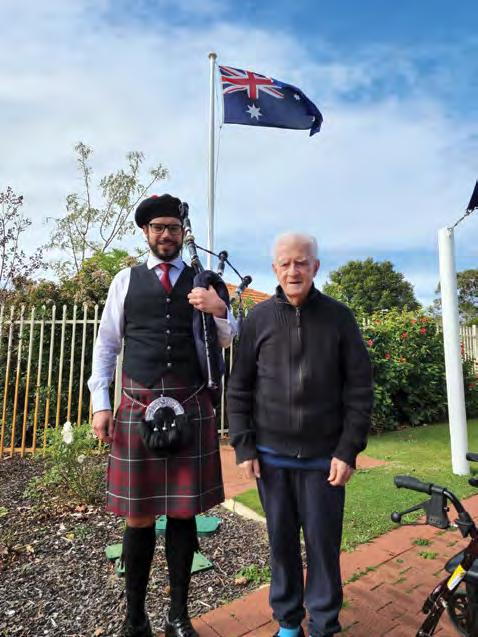
Everyone enjoyed the powerful and distinctive sound of the bagpipes, which is both evocative and stirring, while soaking up the gorgeous winter sun.
Getaway for a Day
As part of our Getaway for a Day Program, Val, a resident from Brightwater Madeley, enjoyed a fantastic outing to watch the Fremantle Dockers.

Brightwater’s Getaway for a Day program is pretty special. It helps facilitate positive social interactions such as activities and excursions for all Brightwater clients.

Baby animals visit The Village
There were plenty of smiling faces with goats waiting to be fed, and chickens wanting to being cuddled, when a baby animal farm visited The Village in October.
What a fantastic way to spend a Friday morning!
39
Celebrating Dads
Residents from our aged care home in Waikiki, The Oaks, were treated to an early Father's Day morning tea and games day. Looks like a fun time was had by all!

Mark is on a new mission for Huntington’s disease
Following a successful world record attempt in 2021, where he smashed the record for the longest distance travelled in a wheelchair with one arm, Mark Elsing has been training for a gruelling upper body ergometer challenge in December.

Mark is taking on the ambitious fitness challenge to raise funds for Brightwater Care Group’s new Huntington’s disease campus.
Graduate Nursing Program celebrated
Sam Watson became the very first person to graduate from our new Brightwater Graduate Nursing Program in September.
Sam has loved his journey with Brightwater so much he is staying on in a role as a Registered Nurse in our transitional care program.
Meanwhile, we welcomed five new nurses to the program during our September intake.
Sam is pictured with our Graduate Nurse Program Coordinator, Hatisha, Service Manager, Glenda, and Chief Operations Officer, Kelly Worlock.

40
Spring in the air
After a long winter, sunshine and a bus trip to the botanical gardens at KingsPark were a welcome outing. Residents from several of our homes enjoyed a chance to view the stunning everlastings and other wildflowers in full bloom.
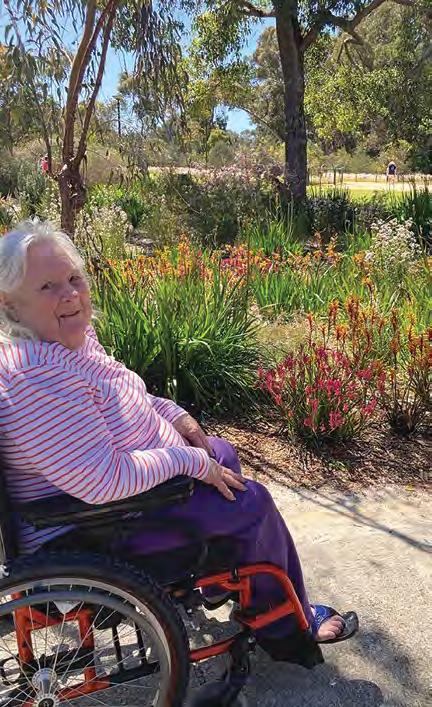
UV trial at Ellison House
As part of a local WA trial around the effectiveness of UV-C as a disinfectant in aged care and disability homes, UVPure and Philips Signify provided two standalone UV-C devices for one of our disability sites, Ellison House.

Thank you to Ed Neilan and the team at UVPure.
Birthdays galore!
Residents at our retirement community Kingsway Court in Madeley have been celebrating birthdays for each month with special morning teas at the community centre.
These have included important milestones for Max Davies (pictured left) and Ernie Shortland (front) who both turned 90!
City of Wanneroo Deputy Mayor Brett Treby (centre) presented Max and Ernie with a certificate on behalf of the City to acknowledge the occasion, as residents shared stories, memories and laughs.

41
14th World Stroke Congress in Singapore
Dr Lakkhina Troeung from the Brightwater Research Centre recently presented at the 14th World Stroke Congress in Singapore in late October.

Lakkhina’s presentation showed that 230 stroke clients admitted to Brightwater Oats Street from 2011 to 2020 were able to make large and clinically significant gains in motor and cognitive function.
Social Housing Economic Recovery Package (SHERP) Grant
Brightwater has been awarded a Department of Communities’ SHERP Grant worth $865,000 to implement home refurbishments at our Supported Independent Living homes in Balcatta, Bentley, Maylands and Warnbro. The works will start in early 2023.

The program is funded by the State Government and covers specific works to the homes including bathroom and kitchen upgrades and improved access.
Announced in June 2020, SHERP is the largest housing maintenance and refurbishment program in WA’s history. It will see the refurbishment of up to 1500 public and community houses, supported accommodation facilities and residential group homes –and we are thrilled to have been successful in our application.
Warm welcome for first residents
November 14 was a very special day as we welcomed the very first residents into our brand new residential aged care home, Brightwater Inglewood.
Two of our first residents are John Caddy (left) and John Pearce (right). They are pictured with our Chief Operations Officer, Kelly Worlock.

42
Christine loves chickens. She especially loves talking to her chickens. However, she couldn’t keep them if she had to move somewhere smaller. That’s why she loves having home care help from Brightwater. Our closeknit team of professionals helps you keep your independence with services such as physio, nursing and help around the house and garden.

can
you be you
your home
Learn more about our services and what sets us apart from others. Go to
or call 1300 223 968
We
help
in
too.
brightwaterathome.com
44 1300 223 968 welcome@brightwatergroup.com brightwatergroup.com ABN 23 445 460 050 ACN 612 921 632










 Reid, Talent Acquisition Specialist at Brightwater
Reid, Talent Acquisition Specialist at Brightwater








 Catherine Stoddart, Chief Executive Officer,
Catherine Stoddart, Chief Executive Officer,



































